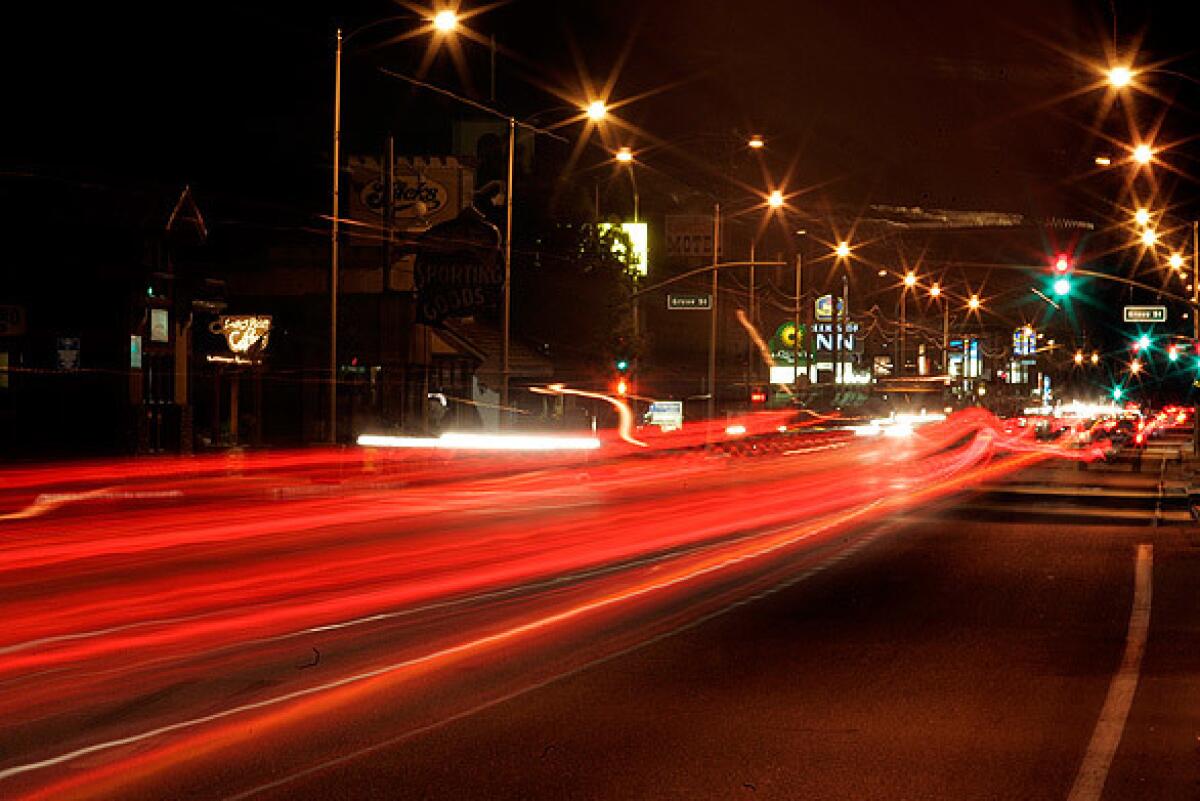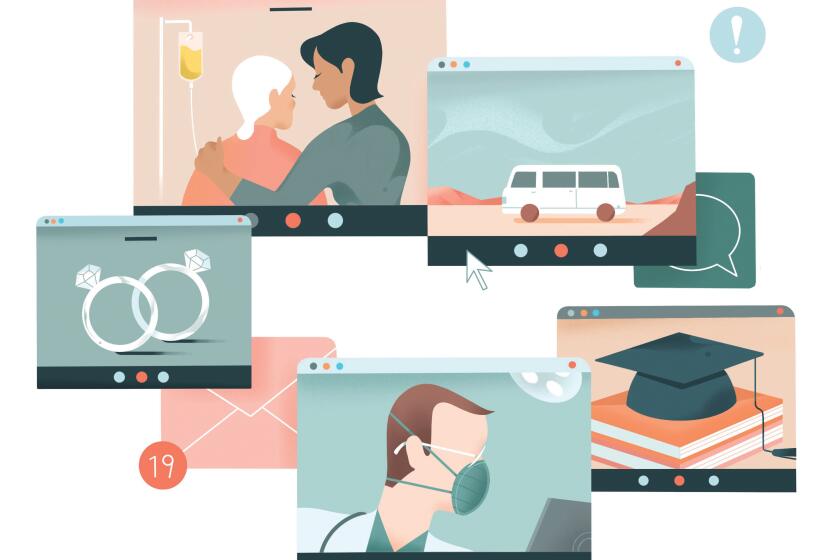Op-Ed: In quarantine, the town of Bishop finds a quiet rhythm. Smoke from the fires pierces it

- Share via
In the middle of the shutdown I do something wild and crazy. I give my little brother a ride to his girlfriend’s house. It’s just five minutes, but we aren’t quarantining together, so I make him sit in the backseat kitty-corner to me and hang his head out the window like a dog. We drive down Line Street and then Main, after dark in our tiny town. We drive past the vacant Trees Motel, the shuttered Mexican restaurants. We pass the signs: on the theater marquee, in the dark shop windows, on sidewalks in chalk. We’re in this together. Bishop will bounce back. Stay strong. You are not alone.
This is the town where I was born, where I now live in a little house with two pepper pots on the porch, perched on the inland edge of California, in a desert valley surrounded by mountains and sagebrush and dust. A few million visitors a year know us as the Eastern Sierra Nevada, home to the Mammoth Lakes ski mountain, to endless fishing streams and hiking trails.
Visiting is one thing; living here is another. In Bishop, everyone recognizes everyone else’s truck. The biggest weekend in this five-stoplight town is an annual festival devoted to mules. More than once at a red light on Main I’ve watched a bag of chips pass back and forth between idling cars. Bishop has hippies and cowboys and climbers all stirred together. Together we wake before dawn when an earthquake makes our hanging pots clatter. Together we listen to the daily test of the emergency siren exactly two minutes before noon. Together we close our windows against the smoke that drifts over the mountains and swap wildfire memes and text each other in horror as the air quality declines. This spring, all together, we shut down. And then reopened. And then shut down.
I was supposed to get married yesterday. Life — and coronavirus — had other plans.
We shut down this time because the smoke is unbearable, the forests too ripe for fire to risk a single visitor. I am trapped in my valley, my smoke bowl, sealed alone inside my house. My town is swaddled in the Inyo National Forest and it is closed, like all of California’s other national forests. And the winds boil, and the visitors leave as one, a line of headlights on the narrow desert highway.
I look out my window and realize I can hardly see my neighbor’s house across the street. On this night, Bishop’s air quality is the worst in the country. The icon on my AQI app wears a gas mask. It’s the worst we’ve ever seen, locals murmur to each other in the store. People in California know fire. Five years ago, my childhood neighborhood burned to the ground. Such a violence. So beyond control, so terrible with waiting to know what will burn. There has been so much waiting these past months.
As a teenager, I knew for four months before it happened that my mother was going to die. My father told my brother and sister and me while we were in the car, parked in the driveway; it was frigid, dark, October. The bent basketball hoop nailed above the garage door cast shadows. My father said something about cancer. He reached with one of his big calloused hands to find mine.
In that moment, the future became a trap.
There was no safe place to live, not even inside in my imagination — not days past, nor days present, nor days to come. Experts call the feeling that followed me around “anticipatory grief”; it occurs before impending loss. I recognized it when the order came from California’s governor: lock down. I was standing in a field when a friend texted me the news, watching the blue dusk gather over the mountains. Cancel everything, my friend said. I went home and lit the fire and closed the doors and those great dark wings, that blurred, diffused dread, settled over my house once more.
That same strange calm. The waiting.
The gathering places were empty — McMurry’s and Rusty’s saloons, Pupfish Cafe, Looney Bean, Spellbinder Books, Whiskey Creek, the brewery. I planned a garden, hung a bird feeder and stared at the quick, living movements of the finches. Neighbors came outside and exercised every power tool they owned. My brother continued to work repairing refrigerators, Lysoling door handles, strapped into his mask. I saw him in Manor Market, and we smiled with our eyes and stood far apart, reached our arms toward each other through the distance.
In the 14th century the Black Death killed 50 million people, at least half of Europe’s population. It killed 80% of the people in some cities. It amazes me, studying history, that we persist. That living things get up and keep going.
In Bishop, we cling to our days. A neighbor got a new job. She told me, sitting six feet away in the backyard, how she had celebrated: snuck a side-hug with a friend, quickly, faces turned away from each other, arms slithering over shoulders — the fireworks of skin against skin.
Then the lights turned on over a changed world. Rusty’s served drinks in the alley. Salsa’s Taqueria put its tables in the parking lot. Bishop Twin Theatre hosted drive-in movies at the fairgrounds, and we all sat in the back of pickups and watched “Urban Cowboy.” For a little while, we breathed.
Then the coronavirus got into a nursing home. And I remembered the four beds in our ICU, four beds to serve a county about the size of Belgium. And then I forget about that for a minute because I’m thinking of fire. And then the smoke.
I watch it swirl beneath streetlights. It travels far from the forests and homes that are burning. It billows over mountains to follow me through my door. The moon is a crescent of orange. The imagination remains a treacherous place to dwell.
Kendra Atleework is the author of the memoir “Miracle Country,” about the Eastern Sierra Nevada.
More to Read
A cure for the common opinion
Get thought-provoking perspectives with our weekly newsletter.
You may occasionally receive promotional content from the Los Angeles Times.











